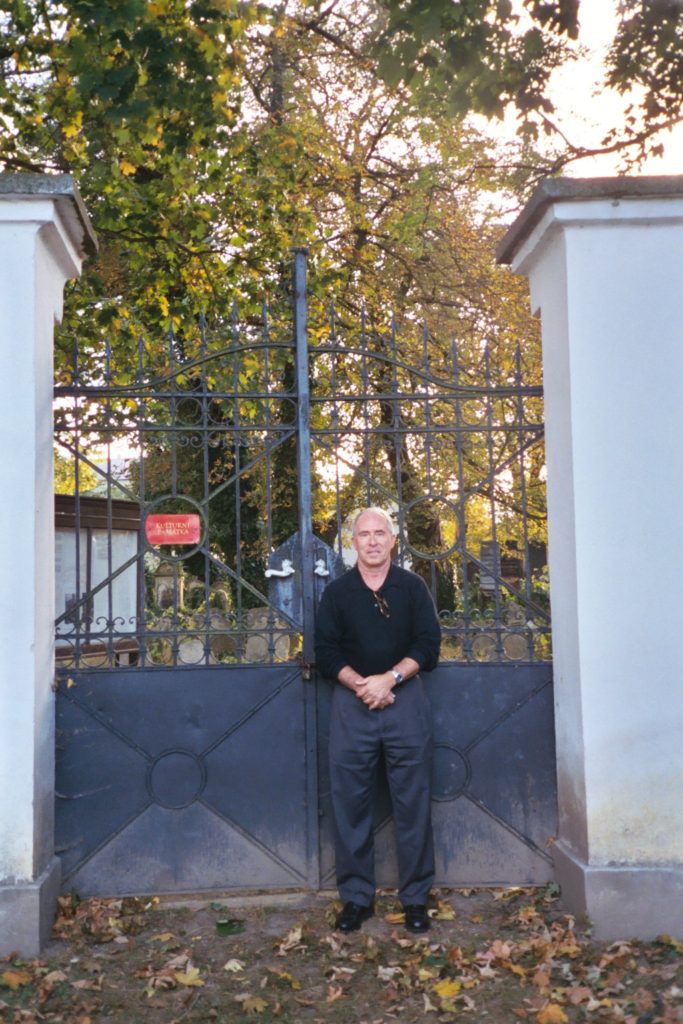Becoming American: a Memoir by Cary Lowe
Becoming American: a Political Memoir by Cary Lowe
Opening Pages of the Book
CHAPTER 1
THE SEARCH
Growing up in postwar Austria, my greatest hope was someday to become an American. A real American, like the khaki-clad soldiers occupying the country or the cowboys in the westerns at the local cinema. My father, a refugee from Vienna who worked on the Nuremberg war crimes military tribunal, promised me that hope would be fulfilled one day. What I didn’t realize then was that becoming American would cut me off from my roots. Many years later, after my parents and my brother had died, I resolved to restore that connection.
***
On a sunny autumn afternoon in 1997, I arrived with my nine-year-old daughter at the entrance of a long-closed Jewish cemetery near Strakonice in the countryside south of Prague. Thirty-five years after my family had left Europe for America, a search worthy of Indiana Jones had brought me and Coralea here from our home in Los Angeles. Inside, I hoped to find the graves of my paternal great-grandparents.
Stepping out of the car into a light breeze, I felt the momentary burst of elation of a marathon runner crossing the finish line. Then reality interrupted. Pursing my lips, I turned to Coralea.
“I just hope this is the right cemetery,” I said. “Aunt Mimi told me only that it was near Strakonice, but she didn’t remember anything more. It’s been a long time since she was here.”
“It has to be the right one,” Coralea responded with the certainty of youth.
Six-foot stucco-encased walls and eight-foot wrought-iron gates blocked our way. If I could get in, would I find the graves? How would I read Hebrew inscriptions on the headstones?
I felt as nervous as when I stood before a federal judge to take my oath of United States citizenship at the age of seventeen. Clasping Coralea’s left hand, I took a step toward the gates, then another and another, with her in tow, until the gates loomed over us like sentinels. An ancient-looking lock the size of my fist secured chains wrapped around the innermost bars. I searched for a sign with information on how to gain entry. A musty smell, a combination of rust and fallen leaves, momentarily caught my attention. Trembling, I reached out with my left hand, grasped the rough bars, and shook them. I knew I would not be entering through those gates.
“We’ve come so far,” I said. “We’ve got to get in there.” Yet, the graves beyond the gates seemed out of reach.
I thought of the stories of my father’s narrow escape from Vienna on the eve of World War II, of my mother’s years in hiding during the war and her harrowing escape, and of their improbable return to Europe for the Nuremberg trials. I recalled the similarly amazing stories of survival told by nearly everyone I knew in my childhood. As my father said, “If they didn’t have an amazing story, they wouldn’t be here to tell it.”
Turning to Coralea, I said, “I wish my parents could be here with us.”
“Especially grandma,” she replied with a sigh. “She wanted to bring me back here so much.”
Closing my eyes, I searched for an answer. My thoughts rushed back over the unlikely path that had led me to this time and place.
I recalled my childhood in Austria, just a few hours’ drive away. The Iron Curtain had blocked us off from our roots for years just as the cemetery walls threatened to do now. Although the slaughter was over, the guns were silent, and the armies mostly had gone home, I lived amid the aftermath of the war—the bombed cities being rebuilt, the Hitler birthplace that cast a cloud over my hometown, my refugee nanny Herma, displaced persons in squatters’ camps, and concentration camp survivors piecing their lives back together.
I remembered my first interactions with Americans—the military occupiers, the intelligence agents that gathered at our home and told wild tales, and my childhood friends in Austria and later in Germany. And the combination of excitement and apprehension I felt later, realizing I was becoming gradually Americanized. I marveled at how immigrating and becoming an American citizen had launched me into a life of political involvement in my adopted country.
Most of all, I thought about how much those experiences had changed my life. I had evolved from a German-speaking, Austrian-born child of war survivors into an English-speaking American, eagerly drawn into a new and exciting culture. What I experienced and witnessed in the years after the war had shaped how I viewed the world, how I interacted with people, and how I identified myself.
In becoming Americanized, however, I had lost much of my connection to those early years and to my family’s places of origin. They had receded behind the more recent people and places of my American experience.
Opening my eyes brought me back to the present. The gates seemed even more ominous. Still holding my hand, Coralea looked up at me expectantly. I peered between the bars at the rows of headstones. The closest ones looked ancient, like those in the old Jewish cemetery in Prague, with weathered, barely legible Hebrew lettering. Behind them stood newer markers, taller and more ornate.
Weeds and grass had so overgrown much of the cemetery that I wondered when anyone had visited last and opened those gates. Whatever I might find inside, I could not imagine being denied after coming this far. I struggled to figure out our next step until Coralea interrupted my thoughts.
“You can do it, Dad,” she said. “You found this place. You can find a way in.”

Standing at the gates of the Jewish cemetery near Strakonice, Czech Republic.
Becoming American: a Memoir by Cary Lowe is proudly powered by WordPress